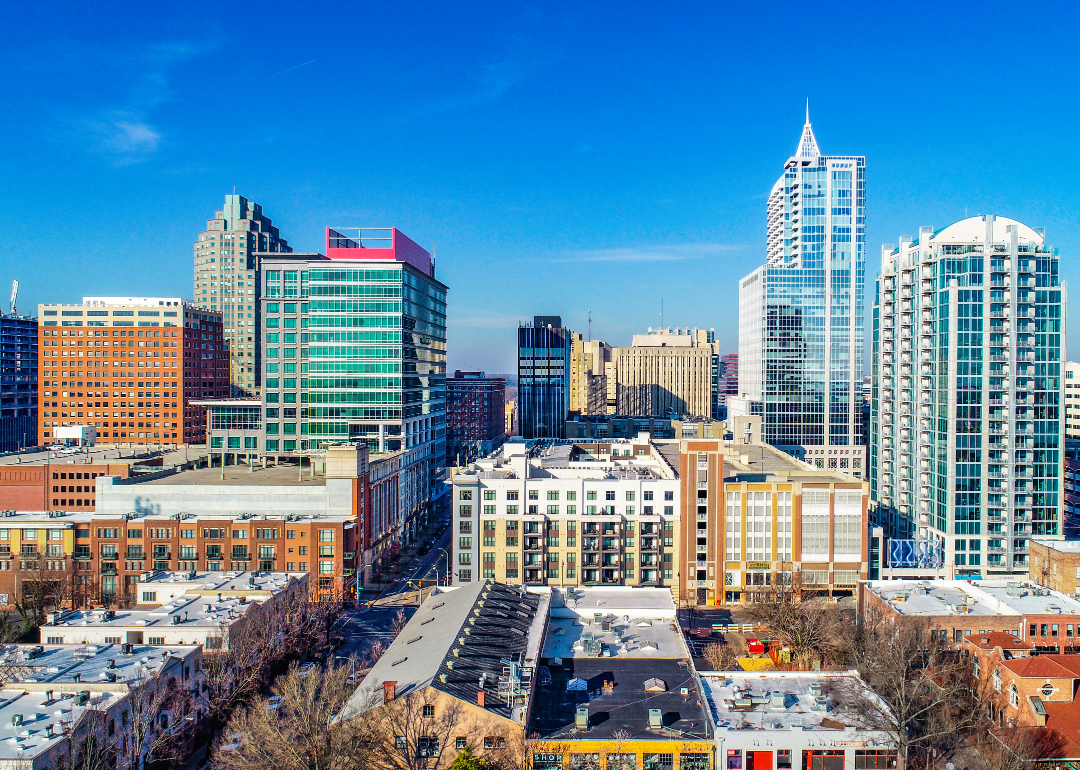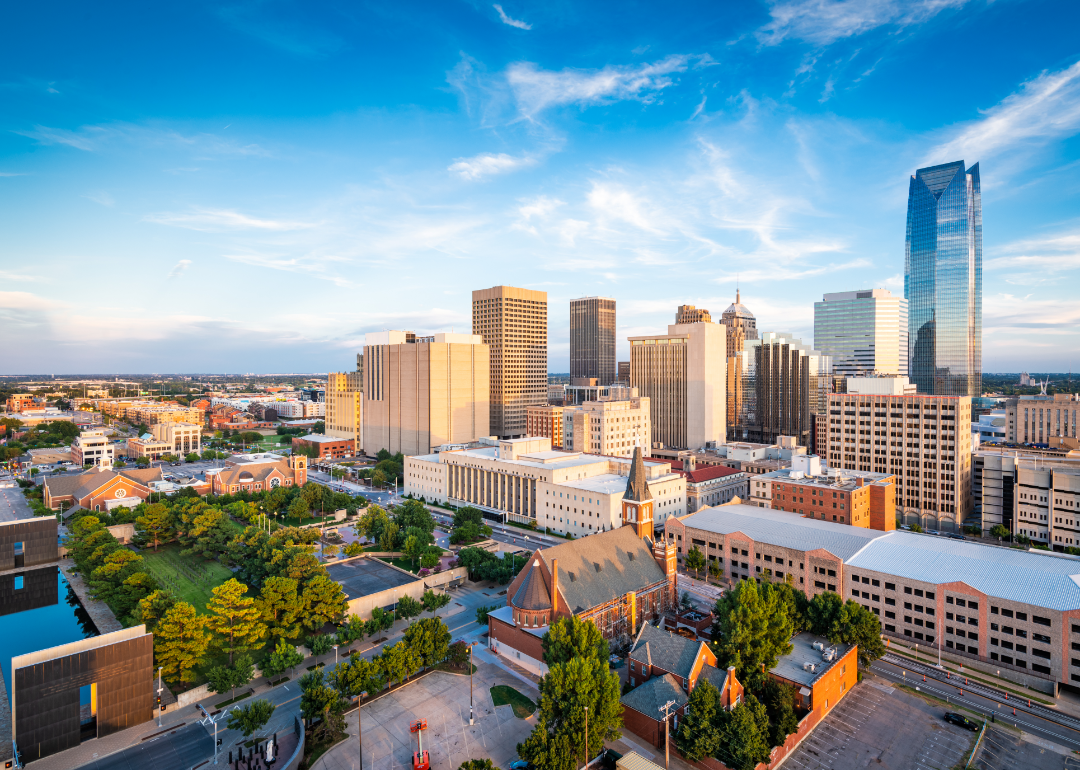10 U.S. cities with the highest rates of car ownership

Canva
10 U.S. cities with the highest rates of car ownership
An aerial view of the Raleigh, North Carolina.
In most cities in the U.S., a car is practically a necessity to get around. That’s more true in some areas than others, which is one of the main reasons car ownership rates vary between cities.
For example, fewer than 70% of households in New York City – which has a relatively comprehensive public transportation system – have access to a car, while some cities have rates of access above 95%.
Whether it’s due to a lack of access to public transportation, the effect of urban and suburban sprawl, or any other number of reasons, having access to a car is clearly critical in these places.
Automoblog examined data to identify the 10 cities with the highest rates of car ownership in the country:
1. Raleigh, North Carolina
Households With Access to a Vehicle: 96.1%
Workers Who Commute by Car: 82%
Average Commute Time: 24.4 minutes
Average Annual Time Lost in Rush-Hour Traffic: 51 hours
Raleigh, North Carolina’s capital, has the highest percentage of households with access to a car in the country. About 82% of the city’s workforce commutes to their jobs by car, with 75% traveling alone rather than carpooling. Numbers like these explain why you’ll often find Oak City drivers jam-packed along Raleigh’s major arteries like the I-440 beltline, Wade Avenue and Capital Boulevard twice a day – and for a few weeks each fall when the North Carolina State Fair comes to town.
2. Nashville, Tennessee
Households With Access to a Vehicle: 95.8%
Workers Who Commute by Car: 84%
Average Commute Time: 25.4 minutes
Average Annual Time Lost in Rush-Hour Traffic: 75 hours
Bars, guitars, and cars: three things you’ll find plenty of in Nashville. The Music City is second only to Raleigh in the percentage of households that have access to a car. And while Nashville is home to the world’s biggest country music stars, it’s also home to some of the worst bottlenecks in the country. If your concert route includes I-24, I-40, or (once again) I-440, leave a little extra time to make sure you don’t miss the opening act.
3. Riverside, California
Households With Access to a Vehicle: 95.7%
Workers Who Commute by Car: 88%
Average Commute Time: 32 minutes
Average Annual Time Lost in Rush-Hour Traffic: 84 hours
While most of the cities on this list are located in the Southeast, Riverside is the West Coast’s lone entry in the top 10. The number of vehicles traveling around this Inland Empire city is enough to rank Riverside ninth in the country for the worst traffic congestion – much of which stacks up around the Riverside Freeway and I-215 near the University of California, Riverside.
![]()

Canva
4. Austin, Texas
An aerial view of Austin, Texas.
Households With Access to a Vehicle: 95.6%
Workers Who Commute by Car: 78%
Average Commute Time: 24.6 minutes
Average Annual Time Lost in Rush-Hour Traffic: 74 hours
Austin is known for being a little different. The “Live Music Capital of the World” is home to world-class art festivals, one of the country’s largest universities, the Texas Capitol, and a unique local culture. However, it’s also home to a lot of cars. Congestion tends to be the worst along I-35 and the MoPac Expressway, where waiting in traffic can feel similar to waiting in line for brisket at Franklin Barbecue.
5. Dallas, Texas
Households With Access to a Vehicle: 95.4%
Workers Who Commute by Car: 85%
Average Commute Time: 26.9 minutes
Average Annual Time Lost in Rush-Hour Traffic: 67 hours
Dallas is synonymous with diversity. With 38 colleges and universities, myriad industries, and one of the country’s most diverse populations, “Big D” has something for everyone. However, that also includes traffic. At nearly 400 square miles, Dallas is a massive, sprawling city – which may be why so many of its households have access to a car. Traffic tends to pile up where you’d expect: at the convergence of major highways such as I-45 at I-30 and US 75 at I-635.
6. Orlando, Florida
Households With Access to a Vehicle: 95.2%
Workers Who Commute by Car: 85%
Average Commute Time: 28.1 minutes
Average Annual Time Lost in Rush-Hour Traffic: 68 hours
Thanks to Walt Disney World, Universal Studios, and more, Orlando is one of the most visited cities in the world – meaning its traffic issues probably come as no surprise. But even without the tourists who flock to O-Town year-round, traffic jams around I-4 and other areas would likely still be an issue given the high percentage of households that have access to at least one car.
7. Charlotte, North Carolina
Households With Access to a Vehicle: 95.1%
Workers Who Commute by Car: 82%
Average Commute Time: 25.6 minutes
Average Annual Time Lost in Rush-Hour Traffic: 58 hours
Charlotte is North Carolina’s largest city and has experienced significant growth in the past several years. All that growth – along with a booming financial sector, professional sports teams, museums, and the country’s seventh-highest rate of household car access – has resulted in regular traffic congestion throughout the city. Predictably, I-77 and I-485 are some of the major pain points. However, traffic can also get seriously backed up on local roads like Independence Boulevard and Providence Road – something that seems a little ironic in the home of the NASCAR Hall of Fame.

Sean Pavone // Shutterstock
8. Oklahoma City, Oklahoma
An aerial view of Oklahoma City.
Households With Access to a Vehicle: 95.1%
Workers Who Commute by Car: 91%
Average Commute Time: 21.4 minutes
Average Annual Time Lost in Rush-Hour Traffic: 55 hours
Despite being the most populous city in the state and the 22nd largest city by population in the country, Oklahoma City commuters experience close to the least amount of time lost in traffic of the locations on this list. You may find some congestion along I-40 or I-235, depending on the time of day. However, the city’s average commute time of under 22 minutes is brief for its size, meaning that even at rush hour there’s still a chance residents will get where they’re going “Sooner” rather than later.
9. Houston, Texas
Households With Access to a Vehicle: 94.8%
Workers Who Commute by Car: 86%
Average Commute Time: 28.6 minutes
Average Annual Time Lost in Rush-Hour Traffic: 86 hours
The country’s fourth-largest city, Houston is known for having the highest concentration of healthcare and research facilities in the U.S. as well as for its thriving museum and theater districts. But with its massive size and sprawl, Houston residents and visitors alike have to travel a good bit to see it all – which is likely why so many homes have access to a car. Although Houston ranks lowest of the three Texas cities in the top 10 for car ownership, many say Houston has the worst traffic in the state.
10. Salt Lake City, Utah
Households With Access to a Vehicle: 94.7%
Workers Who Commute by Car: 75%
Average Commute Time: 19.8 minutes
Average Annual Time Lost in Rush-Hour Traffic: 57 hours
Nestled deep within the Rocky Mountains, Salt Lake City is known for its picturesque views, proximity to national parks, and world-class skiing and winter sports activities. However, a high rate of vehicle ownership has made traffic backups a common occurrence. In a city once known as “The Crossroads of the West,” you may find yourself sitting in traffic both on interstates like I-80 and on local roads like South Temple Street.
Methodology
Household vehicle access, percentage of workers commuting by car, and average commute times were calculated using data from the 2020 U.S. Census. The percentage of workers who use a car to commute includes both workers who travel alone in a car and those who carpool. Statistics for time lost in rush-hour traffic are sourced from the TomTom Traffic Index. These figures refer to the additional time spent commuting compared to normal traffic times for the same routes.
This story was produced by Automoblog and reviewed and distributed by Stacker Media.